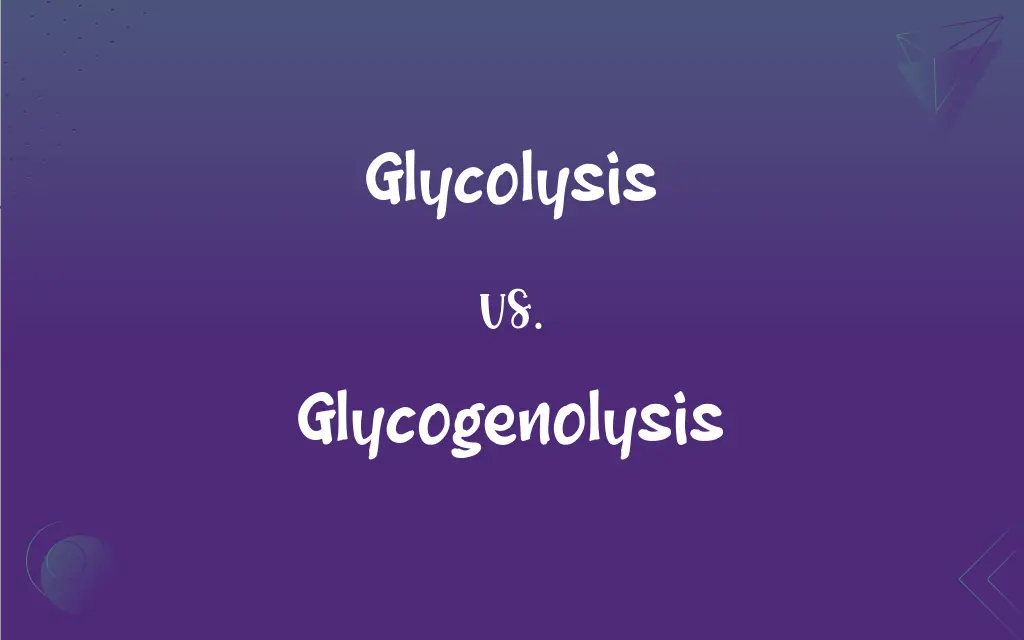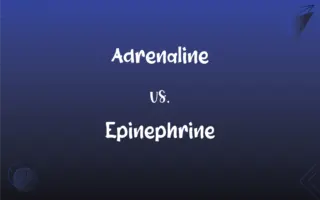Glycolysis vs. Glycogenolysis: What's the Difference?
Edited by Aimie Carlson || By Janet White || Published on January 26, 2024
Glycolysis is the metabolic process of breaking down glucose to produce energy, while glycogenolysis is the breakdown of glycogen into glucose for energy use.

Key Differences
Glycolysis is a fundamental energy-producing process in cells, converting glucose into pyruvate and generating ATP. Glycogenolysis, on the other hand, is the process of converting glycogen, a stored form of glucose, back into glucose.
The process of glycolysis occurs in the cytoplasm of cells and does not require oxygen, making it an anaerobic process. In contrast, glycogenolysis takes place primarily in the liver and muscle cells, providing glucose when blood sugar levels are low.
Glycolysis involves a series of ten enzymatic reactions and is the first step in cellular respiration. Glycogenolysis, however, involves fewer steps, mainly catalyzed by the enzyme glycogen phosphorylase.
In glycolysis, glucose is broken down to produce energy in the form of ATP and NADH. Glycogenolysis serves to maintain blood glucose levels, especially during fasting or intense physical activity.
While glycolysis is a central metabolic pathway present in nearly all living cells, glycogenolysis is specific to organisms that store glucose as glycogen, such as humans and other animals.
ADVERTISEMENT
Comparison Chart
Primary Function
Breaking down glucose to produce energy
Converting glycogen into glucose
Location in Cell
Occurs in the cytoplasm
Primarily in liver and muscle cells
Oxygen Requirement
Anaerobic process (does not require oxygen)
Does not require oxygen
Steps Involved
Series of ten enzymatic reactions
Fewer steps, mainly involves glycogen phosphorylase
Role in Metabolism
Central to cellular respiration
Maintains blood glucose levels
ADVERTISEMENT
Glycolysis and Glycogenolysis Definitions
Glycolysis
The enzymatic breakdown of glucose to pyruvate, yielding energy.
During intense exercise, muscle cells rely heavily on glycolysis for energy.
Glycogenolysis
The process of breaking down glycogen into glucose.
During fasting, glycogenolysis in the liver helps maintain blood sugar levels.
Glycolysis
The first step in the process of cellular respiration.
Glycolysis is essential in both aerobic and anaerobic respiration.
Glycogenolysis
The release of glucose from glycogen stores under hormonal control.
Hormones like glucagon trigger glycogenolysis to regulate blood sugar.
Glycolysis
A metabolic pathway converting glucose into energy and pyruvate.
Glycolysis is a crucial process for energy production in cells lacking mitochondria.
Glycogenolysis
The conversion of stored glycogen to glucose for energy.
Glycogenolysis is activated during high-intensity exercise to provide quick energy.
Glycolysis
A series of reactions in cells that break down glucose to release energy.
Glycolysis provides ATP for cellular activities when oxygen is scarce.
Glycogenolysis
A metabolic pathway for glycogen breakdown in liver and muscles.
In response to adrenaline, glycogenolysis is accelerated to increase blood glucose.
Glycolysis
The anaerobic conversion of glucose to lactate or pyruvate.
Yeast cells perform glycolysis to produce ethanol during fermentation.
Glycogenolysis
The enzymatic process of glycogen degradation to glucose units.
Glycogenolysis is vital for energy supply during periods of low dietary glucose.
Glycolysis
A metabolic process that occurs in nearly all living cells in which glucose is converted in a series of steps to pyruvic acid and during which energy is released in the form of ATP.
Glycogenolysis
The biochemical breakdown of glycogen to glucose.
Glycolysis
(biochemistry) The cellular degradation of the simple sugar glucose to yield pyruvic acid, and ATP as an energy source
Glycogenolysis
(biochemistry) The production of glucose-1-phosphate by splitting a glucose monomer from glycogen using inorganic phosphate
Glycolysis
A metabolic process that breaks down carbohydrates and sugars through a series of reactions to either pyruvic acid or lactic acid and release energy for the body in the form of ATP
FAQs
Is oxygen required for glycolysis?
No, glycolysis is an anaerobic process.
Where does glycolysis occur?
It occurs in the cytoplasm of cells.
What is glycolysis?
Glycolysis is a metabolic pathway that breaks down glucose into pyruvate, producing energy in the form of ATP.
What is glycogenolysis?
Glycogenolysis is the process of breaking down glycogen into glucose.
What are the end products of glycolysis?
Two molecules of pyruvate, two molecules of ATP, and two molecules of NADH.
How many ATPs are produced in glycolysis?
Net gain of two ATP molecules per glucose molecule.
Can glycolysis occur without insulin?
Yes, glycolysis does not require insulin.
Is glycolysis the same in all organisms?
Yes, it is a universal process present in nearly all organisms.
What triggers glycolysis?
The presence of glucose in the cell triggers glycolysis.
What is the rate-limiting enzyme of glycolysis?
Phosphofructokinase is the key rate-limiting enzyme.
Is glycogenolysis a response to high or low blood sugar?
It is a response to low blood sugar.
Is glycogenolysis an aerobic or anaerobic process?
It is neither; it doesn't directly involve oxygen or anaerobic conditions.
Does glycolysis require enzymes?
Yes, several enzymes are required to catalyze each step of the pathway.
What is the difference between glycogenolysis and gluconeogenesis?
Glycogenolysis breaks down glycogen into glucose, while gluconeogenesis synthesizes glucose from non-carbohydrate sources.
Can glycogenolysis occur in the brain?
No, the brain does not store glycogen for this process.
What enzyme initiates glycogenolysis?
Glycogen phosphorylase is the enzyme that initiates this process.
What are the end products of glycogenolysis?
The end product is glucose-1-phosphate which is converted to glucose-6-phosphate and then to glucose.
Where does glycogenolysis occur?
Mainly in the liver and muscles.
What hormones trigger glycogenolysis?
Glucagon and adrenaline primarily trigger glycogenolysis.
How is glycogenolysis regulated?
It's regulated by hormonal signals and the energy needs of the body.
About Author
Written by
Janet WhiteJanet White has been an esteemed writer and blogger for Difference Wiki. Holding a Master's degree in Science and Medical Journalism from the prestigious Boston University, she has consistently demonstrated her expertise and passion for her field. When she's not immersed in her work, Janet relishes her time exercising, delving into a good book, and cherishing moments with friends and family.
Edited by
Aimie CarlsonAimie Carlson, holding a master's degree in English literature, is a fervent English language enthusiast. She lends her writing talents to Difference Wiki, a prominent website that specializes in comparisons, offering readers insightful analyses that both captivate and inform.
































































